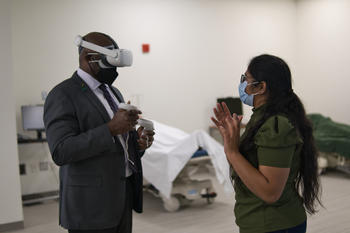Graduate student Sindhu Mallala studies health informatics at Mason to gain a deeper understanding of how technology can transform all aspects of health care.
For Sindhu Mallala, serving as a physician in her home country of India is an honor. She learned about the essential role physicians have in health care while studying at the Dr. NTR University of Health Sciences in Andhra Pradesh, India. When she began practicing medicine, she realized the impact she could make by incorporating her dedication to helping others with her love of science and technology to resolve issues that health systems in India were experiencing.
"While working, I saw the amount of data we collected in a hospital [that] just sat in piles, as the concept of digital records is still not as established back home," said Mallala. "I looked up ways to make sense of it, like pieces of a puzzle to solve both medical and hospital issues; Health informatics was the answer to my question."
Mallala's mission to study health informatics fueled her move to America to gain a deeper understanding of how technology can transform the way health systems operate, especially in storing, managing, and accessing critical patient data more quickly and securely.
"The health informatics program at Mason is well-tailored,” Mallala said when asked why she chose Mason for graduate school. “I wanted to learn from the best, so I could go back home and use this in a way that helps everyone in my community."
While at Mason, Mallala pursued opportunities that gave her insight into just how impactful technology can be—not just for hospital operations but also for training the next generation of health care providers.
Discovering New Opportunities at the Virtual Reality Simulation Lab

Mallala soon became a graduate teaching assistant at the College’s Virtual Reality Simulation Lab, an opportunity that allowed her to have a direct role in discovering how technology can reshape the future of health care. The Lab provides students in various health majors with interdisciplinary opportunities to practice the skills they learn in class through virtual real-world scenarios. For Mallala, this was a chance to incorporate her clinical background with her newfound knowledge of health informatics.
"The Virtual Reality Lab encourages critical thinking and provides a safe space to practice and make mistakes," said Mallala. "Improving technical and patient communication skills are two primary goals of our Lab. We practice evidence-based medicine, and most of the cases that we practice are with diagnoses that students might come across during their [training]."
Having the opportunity to help prepare future health care professionals through virtual reality technology has developed Mallala's perspective on the possible ways technology can enhance health care delivery and training. With her education in health informatics and experience as a physician, she selects appropriate cases for students to explore in virtual reality that align with their course requirements. She also assists Bethany Cieslowski, VR and simulation coordinator in the School of Nursing, in setting up the lab and debriefing with students about the cases they completed.
Until Mason, Mallala said that she did not consider virtual reality simulation as a way to train medical professionals.
"I find the concept of learning skills and practicing patient case management in a lab to be quite intriguing,” she said. “The Lab serves as an opportunity [to prepare students] to handle cases in an informed and methodical way. I've gained a great deal of knowledge from this interprofessional association of informatics and nursing. My perspective on education has shifted significantly as a result of the Virtual Reality Lab. I personally learned a great deal from Dr. Bethany Cieslowski, my mentor, about how to engage students and encourage participation."
In her pursuit to strengthen herself as a physician by obtaining a master's degree in health informatics, Mallala values the many opportunities she receives at Mason that have aided her along her journey in health care. Now, she looks to the future for ways she can further health and technology research by applying her clinical knowledge with her newfound technological skills.
"Now that I have been on both sides of the spectrum, IT and as a health care provider, I have a better understanding of how to bridge the gaps in between,” Mallala said.
